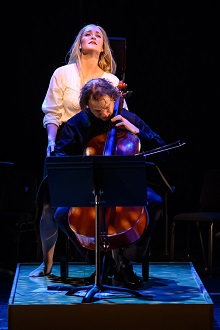
The tragically brief life and career of virtuoso cellist Jacqueline Du Pré is a source of great interest for contemporary historians and classical music aficionados. Du Pré’s was forced to end her internationally acclaimed performing career at age 28 when worsening multiple sclerosis (MS) symptoms made it impossible for her to play. Despite the brevity of her career, she is widely regarded as one of the greatest cellists of all time.
Tapestry Opera’s world premiere production of Jacqueline is a musical memoir and homage to the artist’s life. The intimate piece by composer Luna Pearl Woolf is written for soprano and cello. I would describe Jacqueline as a narrative, dramatized song cycle. Lyrically, it is more poetic than prose.
Each aria of the four-movement work is a vignette of a key moment in Du Pré’s life. We begin with her early successes as a teenage prodigy, meeting the love of her life pianist Daniel Barenboim, their intense musical and romantic connection and converting to Judaism to be with him. Finally, we grieve with Du Pré as she is forced to resign from public performance and becomes increasingly disabled by her illness.
The set design for this production is well-conceived. Du Pré and her cello (embodied by cellist Matt Haimovitz) are surrounded by the seating for a full orchestra, but the players never appear. As Du Pré’s life is overtaken by illness and music is silenced, the orchestra’s chairs float out of place and become increasingly jumbled.
Soprano Marnie Breckenridge and cellist Matt Haimovitz are sublime musicians. Breckenridge’s voice is bright and pure, with glorious high notes possessed of a razor-sharp edge. Dramatically she does a commendable job of communicating Du Pre’s transition from a bubbly, overconfident adolescent music star to a disabled middle-aged woman.
Haimovitz plays as though he and his instrument share a body, transitioning between a range of techniques seamlessly. I especially appreciated the effervescence he infused into an inherently dark instrument during a notable pizzicato sequence accompanying some patter-style dancing from Breckenridge.
Compositionally, Jacqueline is not my cup of tea. Compositional devices are over-utilized and therefore boring by the end of the piece. Big, dissonant, melodic leaps from a low pitch to a high pitch occurred repetitively throughout. While this gave Breckenridge ample opportunity to show off her ability to soar from low note to high note with ease and elegance, it got old and was not especially pleasing to the ear.
The production could also benefit from more intensive movement coaching. There were moments where the choreography and blocking looked decidedly awkward. The most glaring example being during the fourth and final movement, when she sings an aria about using her posterior as transport, as she is now too paralyzed to walk. Her legs are oddly mobile as she drags herself across the stage. In fact, her legs appear to be the primary source of propulsion. It looked rather comical to me. While there is humour in the lyrics, it did not seem as though her physical condition was meant to be funny and it disrupted the emotional impact of the scene.
My difficulty with some of the composition and stage movement detracted from my overall enjoyment. My companion agreed with me about these elements but this position was by no means unanimous. There were audible sighs of delight when Haimovitz set down his bow. The final cello solo is indeed stunning and friends I ran into at the show texted me afterward to say just that. They, on the other hand, had difficulty with the libretto, a view I do not share. Clearly everyone is different.
They also would have liked more instruments. I disagree with that perspective as well. I enjoyed the intimacy of a piece written just for voice and cello. Works for voice and cello are usually supported by the piano as well. The absence of a harmonic instrument created an overall effect that lay somewhere between harmony and polyphony and which leveraged the full harmonic potential of the cello.
Du Pré’s story is certainly compelling and the piece has potential. There are definite moments of compositional beauty and innovation. Observing audience reactions, I wondered if the story was more poignant for those who remembered Du Pré’s brief but luminous career.
Regardless of your familiarity with Du Pré, I think Jacqueline is a wonderful musical tribute to her life and contributions to the performance of classical music. I think this is very apt to be an enjoyable evening of music for new music enthusiasts and contemporary historians in particular.
Details:
- Jacqueline is playing until February 22, 2020 at Betty Oliphant Theatre (404 Jarvis Street)
- Showtimes are 8 PM on February 19-22, with an additional matinee at 4 PM on February 23, 2020.
- Tickets prices range from $35-70.
- Tickets are available online.
Photo of Marnie Breckenridge and Matt Haimovitz by Dahlia Katz

Thanks for your excellent review. The last paragraph I see as a polite way of not being utterly negative..
This show was unbearable, for all the reasons you give plus the totally wrong impression conveyed about J. Dupré…
I left at the intermission with two other ladies also very disappointed, and like me fans of Jacqueline Dupré